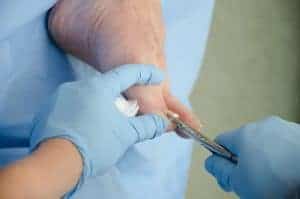
Best treatment for an ingrown toenail
The Best thing you can do for your ingrown toenail is see a podiatrist specializing in ingrown nails, like Dr Teimouri DPM. She is kid friendly and knows they are scared and need special treatment. Also she will wait until it is totally numb and never rush you. Third, as a woman she knows that you want your nail to LOOK good after it’s healed. This attention to detail makes Dr Teimouri DPM one of the best Podiatrist in Pittsburgh to fix it.
There are temporary treatments that are used for nails that are infected nails or for times when you dont have time to heal after a permanent procedure (like with an upcoming tournament or just before a vacation)
Then there are permanent ingrown toenail treatments that will keep the ingrown from coming back. This is called a Matrixectomy and is best done by a Podiatrist. This procedure is done in minutes in the office and may thump a bit that evening, but rarely is anything stronger than Ibuprofen necessary for the discomfort. Aftercare includes soaking the toe in warm water and applying an antibiotic ointment and a band aid daily for about 2 weeks.

Lasers to treat toenail fungus for thick ugly nails are also available
If Your Ingrown Nail Is Mild Then You Can Try These Home Remedies!
One of the best thing about ingrown nails in that if it’s mild then you can try some home remedies to decrease it’s symptoms or even eradicate it completely!
Here are some of the most useful natural remedies, but use them if only your situation is mild:
- Wear Comfortable Shoes
Tight shoes or shoes that don’t provide enough space can be a perfect cause of ingrown nails.
Since if your toenail doesn’t have enough space to move, it will be pushed inside your skin which will lead to ingrown nail.
However, this problem can be treated easily by changing your shoes, buy new shoes and don’t forget to buy the ones that provide enough space to your toes.
If your socks are tight then you must change them as well.
- Use Antibiotic Ointments
Ingrown toenail can easily lead to infection because of the injury caused by your nail, therefore using antibiotic spray, creams and ointments can be a good natural treatment.
These antibiotic ointments will help you prevent infections, decrease the inflammation, discomfort and help your wounds heal faster!
This kind of antibiotic treatments can be easily found in medical stores, however if you develop signs of infection contact your doctor first.
- Soak Your Feet
Soaking may not seem so useful but it isn’t the truth, when you soak your feet properly your nails become soft.
When this happens you have a good chance to fix your nail and change it’s growth direction!
But that’s not the end, soaking your feet and toes can relieve pain, discomfort and it can decrease your swelling as well.
And if you soak your feet in apple cinder diluted water then that’s even better because it can help you get rid of infections with ease.
Can ingrown nails lead to permanent damage to the nail or surrounding tissue?
Yes, ingrown nails can potentially lead to permanent damage to the nail or surrounding tissue if left untreated or if there are complications. For example, if an ingrown nail causes a recurrent infection in the nail bed, it can lead to chronic inflammation and damage to the nail matrix, which is responsible for nail growth. In severe cases, this can result in the permanent distortion or destruction of the nail.
How do ingrown nails differ from other nail conditions, such as nail fungus?
Ingrown nails and nail fungus are two different conditions that affect the nails in distinct ways:
- Ingrown Nails: Ingrown nails occur when the edge of a nail grows into the surrounding skin, leading to pain, swelling, and sometimes infection. They are usually caused by improper nail trimming, tight-fitting shoes, or injury to the nail. Ingrown nails primarily affect the toenails, although they can occur on the fingernails as well.
- Nail Fungus (Onychomycosis): Nail fungus is a fungal infection of the nail that causes the nail to become discolored, thickened, and brittle. It can affect both the toenails and fingernails.
Are there any complications associated with ingrown toenails, such as nail bed infections?
Yes, there are several complications associated with ingrown toenails, including nail bed infections. When the edge of the nail grows into the surrounding skin, it can create a break in the skin, allowing bacteria to enter and cause an infection. Signs of an infected ingrown toenail include increased pain, swelling, redness, warmth, and pus drainage.
In addition to infections, other complications of ingrown toenails can include:
- Chronic pain and discomfort
- Formation of granulation tissue (overgrowth of tissue) around the ingrown nail
- Recurrent ingrown toenails
- Skin changes, such as thickening or overgrowth of skin (hyperkeratosis)
- Nail deformity or damage
- Impaired nail growth.
pittsburgh area 10 locations laser spa…
Call 898-313-FEET (3338)
for more information click…
Ingrown Toenail Treatment Pittsburgh
If you get recurring ingrown or infected toenails, the local Pittsburgh Podiatrists at Beaver Valley Foot Clinic have a simple 5 minute office procedure to permanently kill ingrown toenails at the root of the problem! … Continue reading
